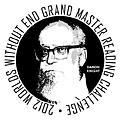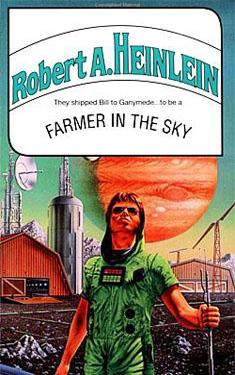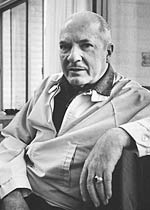GMRC Review: Farmer in the Sky by Robert A. Heinlein
 Jeremy Frantz (jfrantz) reviews SF/F books on his blog The Hugo Endurance Project where he has given himself just 64 weeks to read every Hugo Award winner. This is his third GMRC review.
Jeremy Frantz (jfrantz) reviews SF/F books on his blog The Hugo Endurance Project where he has given himself just 64 weeks to read every Hugo Award winner. This is his third GMRC review.
 Farmer in the Sky is a YA title, of which Heinlein wrote over a dozen, and this was my first. Here, Bill Lermer and his father, George, have applied for permission to emigrate to Ganymede, the third moon of Jupiter. We follow them on their trip out and as they navigate the hardships of colonizing and farming the harsh moon’s lava-encrusted landscape and also deal with the occasional life-threatening disaster millions of miles from Earth.
Farmer in the Sky is a YA title, of which Heinlein wrote over a dozen, and this was my first. Here, Bill Lermer and his father, George, have applied for permission to emigrate to Ganymede, the third moon of Jupiter. We follow them on their trip out and as they navigate the hardships of colonizing and farming the harsh moon’s lava-encrusted landscape and also deal with the occasional life-threatening disaster millions of miles from Earth.
So (not) Heinlein
This is Heinlein’s second Hugo winner of the 1950’s, after Double Star (1956), (first technically, but it was a retro) and if there is anything similar about these two novels, it is the characters. They are the kind of people that no one really is, but everyone identifies as the kind of person they are or would like to be. Bill is just one of those characters (George too, but who cares about George really). I was sorry I didn’t read this book at a younger age because Bill was totally one of those characters who I would have tried so hard to emulate…and would have been so sad when I didn’t.
Apart from the characters, the style of the rest of the book was rather dry and straightforward and generally subdued compared to any of Heinlein’s other titles I’ve read. Somehow it seemed fitting considering the younger audience and it’s never dry to the point of boring, but it is a noticeable departure from I have become accustomed to in his later works (even Double Star).
Heinlein has also been credited through the years with a number of predictions of future technologies (though some, like GPS in The Number of the Beast, are debatable). It is always fun when a SF author predicts some crazy contraption and this is another of those situations. In Farmer in the Sky, Heinlein is said to have predicted the microwave oven. The story first appeared in Boys’ Life in 1950 and I’m not entirely clear on when microwave ovens were invented for home use so I can’t really add anything to that discussion other than continued mystery and intrigue. Nevertheless, if that’s your thing, then you may be interested.
Emigration
Bill’s Earth is overcrowded and seeing animals like mountain lions is rare, if there’s even any left. Aliens exist on Mars and Venus which, as we all know, I love to see and humans have already begun colonizing the solar system as far out as Jupiter’s moons. Back on earth, food has been rationed and with Bill’s mother dead, Bill cooks for his father and makes sure their meager rations are accounted for.
Things don’t seem to have reached Malthusian proportions yet, but life has definitely grown uncomfortable for the people on Earth. So when another ship is commissioned to send emigrants to Ganymede it is easy to understand Bill’s sudden interest without having to be told everything he ever thought about settling on another planet.
Heinlein actually does a pretty spectacular job of painting an extremely subtle picture of what life and Earth was like and allows the reader to fill in the gaps, which I also love. There are some times that the book is more Hard SF, but those are really just the parts of space travel and astronomy that Bill is interested in so it’s kind of fun that the book slips in and out of different styles.
Back to the point though, the reasons for emigrating at this point in the story are ostensibly just to alleviate the population pressures on Earth, but we come to understand that everyone really has their own reasons for leaving and a real sense of adventure pervades the first eight or nine chapters. Reading from a teenager’s perspective only added to the excitement and I had a lot of fun with it. Thinking about it now though, it is a little strange (in a good way) to think of how dangerous the journey out was but how light-hearted the book felt in the face of a lot of unknowns about what life would really be like on one of Jupiter’s moons.
And now for something completely different…
That is, until they actually reach the surface of Ganymede. Heinlein has let us have our fun and now he makes us pay up. From this point forward, everything is the worst and the universe sucks so I hope you weren’t too attached to the fun of getting out here. The material completely changes and the entire pace of the book slows down, in a really good way… Bill grows up.
 Of course, settling and attempting to farm a lifeless, freezing, lava-encrusted moonscape is going to be difficult and I guess you could expect this to happen, but then Heinlein piles on more. Disaster strikes the entire moon and nearly kills everyone and just as soon as we recover, Bill has a discussion with another settler/scientist who completely rocks his worldview. And right after that Bill stumbles on a discovery that changes everything he knows about the universe. I don’t want to give this away, but it gets pretty grim…and Bill handles it! Not handles it like some technology saves the day and “oh what a happy ending,” but he struggles with it internally and then consciously chooses to face a suddenly very foreboding future. How cool is that?! I thought it was great to see a young man deal with a problem in a way that most adults don’t. Read this kids!
Of course, settling and attempting to farm a lifeless, freezing, lava-encrusted moonscape is going to be difficult and I guess you could expect this to happen, but then Heinlein piles on more. Disaster strikes the entire moon and nearly kills everyone and just as soon as we recover, Bill has a discussion with another settler/scientist who completely rocks his worldview. And right after that Bill stumbles on a discovery that changes everything he knows about the universe. I don’t want to give this away, but it gets pretty grim…and Bill handles it! Not handles it like some technology saves the day and “oh what a happy ending,” but he struggles with it internally and then consciously chooses to face a suddenly very foreboding future. How cool is that?! I thought it was great to see a young man deal with a problem in a way that most adults don’t. Read this kids!
Recommendation
I really, really liked that Heinlein respected his younger readers enough to trust them to deal with some difficult topics. I’m a firm believer that adults expect too little of our younglings and while I’m not sure how I would have handled this in my early teens, I appreciated it now. Overall, if you’re in the mood for some juvenile fiction, Farmer in the Sky is definitely the way to go.



















 Full Details
Full Details


4 Comments
Samuel R. Delany said somewhere that this book, which he read in his early teens, made him want to be a writer.
Another excellent review! Thanks Jeremy. It’s probably safe to say that Heinlein did not invent the idea of the microwave oven. The company Raytheon patented it in 1946. My favorite Heinlein invention is the capillotomer from "Beyond This Horizon" – show me a guy who does not want that instant shave!
@ Thomas That’s pretty interesting. I’ve never gotten around to reading anything by him, but I know he won a couple Nebulas so now I’m doubly interested.@ Emil Thanks. I kind of suspected this had come around too late to count. If nothing else, it might speak to how proficient Heinlein was at creating worlds and gadgets that seem so plausible. I’m also not aware of the capillotomer but I’m very curious. Yet another TBR I guess 🙂
I read this one a few years ago and really enjoyed it. I cut my Heinlein teeth on a few of his later novels (Friday and Time Enough for Love) which I enjoyed very much, but the handful of juveniles I’ve read have touched a deeper cord. They do a nice job of encapsulating a sense of wonder and they have a nostalgia factor that is one of the big draws for me in reading "classic" science fiction.I couldn’t agree more in the praise for Heinlein not speaking down to his audience. It seems a common practice in his juveniles that he doesn’t shy away for difficult themes and is more than ready to add some science in there as well, assuming that his audience is smart enough to take it. And I believe they were, and are.
Sorry, the comment form is closed at this time.